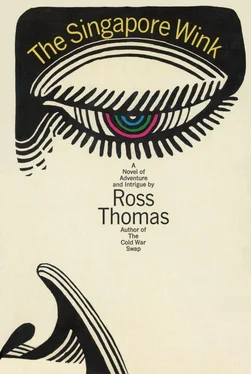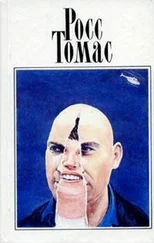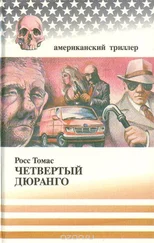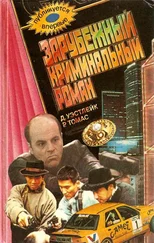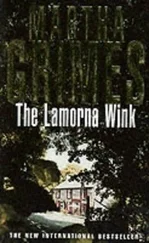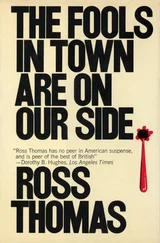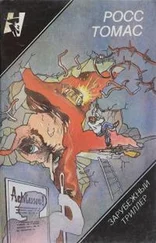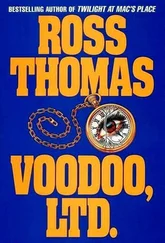Ross Thomas
The Singapore Wink
He was probably the only man in Los Angeles wearing spats that day, pearl grey ones that peeped out from beneath the uncuffed trousers of a grey suit so dark that it seemed almost black. There was a white shirt and a neatly knotted pale grey tie that blossomed a trifle before it ducked behind a vest. There was a hat, too, but it was only a hat.
If either of the two men who came in out of the rain were a customer, it would be the other one, the big man with the tightly cropped grey hair and the left arm that stuck out at an acute angle as if he couldn’t straighten it all the way. He circled the car slowly, opened a door and slammed it, beamed at the satisfying thunk, and then said something to the medium-sized man in the spats who frowned slightly and shook his head.
The car was a cream-colored 1932 Cadillac V-16 roadster that became all mine after its owner, a plunger in the commodity market, made a disastrous guess about sorghum futures. The bill for the restoration of the car amounted to $4300 and the commodity plunger, gloomy and depressed, had apologized for an hour about his inability to pay. Three days later he had sounded optimistic, even cheerful, when he phoned to assure me that a deal had almost jelled and that soon everything would be worked out. It was, around five the next morning, when he poked the barrel of a.32 revolver into his mouth and pulled the trigger.
The Cadillac, with a $6500 price on it, was now the centerpiece in the showroom, flanked by a 1936 Ford four-door convertible cabriolet and a 1938 SS 100 Jaguar. I was asking $4500 for the Ford and the Jaguar was tagged at $7000, but any reasonably neat stranger with a clean shirt, a checkbook, and a driver’s license could have had his choice for an offer of $500 less.
The big man, really big, well over six-three, lingered by the Cadillac, not quite ignoring the growing impatience of his friend in the spats. The big man wore a double-breasted blue blazer with gold buttons, grey flannel slacks, a white turtleneck polo shirt, and the ecstatic expression of a crap shooter who has just hit his seventh straight pass. I decided that he was too old for both the expression and the clothes.
The man in the spats frowned again, said something, and the big man took a last, savoring look at the Cadillac before they started back towards my corner office, a glassed-in cubicle that held a desk, a safe, three chairs and a filing cabinet. The big man came in first and he didn’t bother with the amenities.
“How much you want for the Caddy?” His voice didn’t go with his size. It was high, almost piping.
Because he might be a customer, I took my feet off the desk. “Sixty-five hundred.”
The smaller man, the one with the spats, wasn’t listening. After he gave me a quick glance he let his eyes wander around the office. There wasn’t a great deal to see, but he looked as if he hadn’t expected much.
“This used to be a supermarket,” he said. “An A&P.”
“It used to be,” I said.
“What’s the sign outside mean — Les Voitures Anciennes? ” He did better with the French than most.
“Old cars. Old used cars.”
“Why don’t you say so?”
“Then nobody would ask, would they?”
“Class,” the big man said, staring at the Cadillac through the glass office wall. “Real class. How much you actually take for the Caddy, no kidding?”
“It’s completely restored, all parts are original, and the price is still sixty-five hundred.”
“You the owner?” the smaller man asked. His r’s gave him away; so did his t’s. He was from the East Coast, either New Jersey or New York but it could have been a long time since he had lived there.
“One of them,” I said. “I have a partner who handles the mechanical side. He’s in the back.”
“And you sell them?”
“Some days,” I said.
The big man turned once more from his lingering inspection of the Cadillac. “I had one like that once,” he said dreamily. “Except it was green. Real dark green. Remember it, Solly? We drove it down to Hot Springs that time with May and that other doll, the one you had, and we run into Owney.”
“That was thirty-six years ago,” the man in the spats said.
“Christ, it sure don’t seem that long.”
The smaller man turned to one of the chairs, took out a white handkerchief, flicked it over the seat a couple of times, put it back in his hip pocket, and sat down. His movements had been neat, precise and unhurried. He leaned back in the chair, produced a thin gold cigarette case and took out an oval cigarette. Or perhaps the case was so thin that it mashed his cigarettes into ovals. He lit it with a gold Zippo.
“I’m Salvatore Callese,” he said, and I noticed that his suit jacket had no pockets. “This is my associate, Mr. Palmisano.”
He didn’t offer to shake hands so I merely nodded at both of them. “Are you interested in some particular car, Mr. Callese?”
He frowned at that and stared at me with dark brown eyes that curiously seemed to have no sheen. They looked dry and dead and I almost expected to hear them rustle when they moved. “No,” he said. “I’m not interested in used cars. Palmisano here thinks he is, but he’s not. What he’s really interested in is thirty-five years ago when he could still get it up and he thinks maybe the Caddy out there would help. But you don’t get that back with a thirty-six-year-old used car, although I’d say that a lot of your customers might think so.”
“Some of them,” I said. “I sell a lot of nostalgia.”
“Nostalgia,” he agreed. “A secondhand nostalgia dealer.”
“I just like the car, Solly,” Palmisano said. “For Christ’s sake, can’t I even like a car?”
Callese ignored him. “You’re Cauthorne,” he said to me. “Edward Cauthorne. It’s a nice name. What is it, English?”
I shrugged. “We were never much on tracing the family tree. I suppose English will do.”
“Me, I’m Italian. So’s Palmisano. My old man was a greaseball; couldn’t even speak English. Neither could Palmisano’s.”
Both of them were in their late fifties or early sixties and Palmisano, despite the left arm that jutted at an odd angle, looked fit and lean and as if he still wouldn’t mind a day or two of hard physical labor. He had a long, spade face with a thick-lipped mouth that seemed too wide for the piping voice that came out of it. His nose hooked nicely towards a strong chin and his black eyes were shaded by long grey lashes that blinked a lot, as if in perpetual surprise.
“Are you selling something,” I said, “or did you just come by to get in out of the rain?”
Callese dropped his cigarette on the floor and carefully ground it to shreds with a neat black shoe. “Like I said, Mr. Cauthorne, I’m Italian and Italians put a lot of stock in family. Uncles, aunts, nephews — even second and third cousins. We’re close.”
“Tightly-knit,” I said.
“That’s it. Tightly-knit.”
“Insurance perhaps? It’s only a guess.”
“Hey, Palmisano, you hear that? Insurance.”
“I heard,” Palmisano said and almost smiled.
“No, we’re not selling insurance, Mr. Cauthorne. We’re just doing a favor for a friend of mine.”
“And you think I can help?”
“I think so. You see, this friend of mine lives in Washington and he’s getting on in years. Not old, but he’s getting up there. And just about all the family he’s got is this godson.”
“It’s all he’s got,” Palmisano said.
“That’s right,” Callese said. “It’s all he’s got. Now this friend of mine over the years has built up a fine, legitimate business and naturally he’s looking to leave it to somebody close, like a relative, but the only thing he’s got like a relative is this godson and the godson can’t be found.”
Читать дальше
